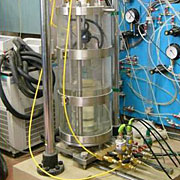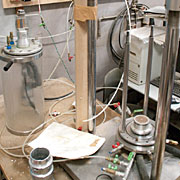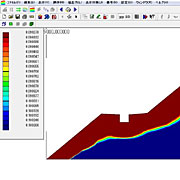Evaluation for mechanism of ground disaster subjected to freeze- thaw action
Temperature difference between summer and winter season is large in cold regions such as Hokkaido. The soil structures in such regions are located in the harsh weather conditions.
In winter season, the fabric (arrangement of soil particles) or density of soils changes by volumetric expansion due to pore water freezing. In spring season, the thawing of frozen pore water (or ice) loosens the ground. If heavy rain fall or huge earthquake occurs in such situation, the loosened ground due to freeze-thaw action is failed easily. Therefore, the effects of freeze-thaw action on the mechanical behavior of soils are investigated.
In Hokkaido region, various types of volcanic soils widely deposits and the volcanic sandy soils have been used for construction materials. The micro voids exist in the soil particles of volcanic pumices. The properties of such materials are different from the ordinal soil particles. The particle breakage is the popular characteristics of such volcanic soil material.
In order to do suitable design for the volcanic soils, strength and deformation characteristics under unsaturated and freeze-thaw condition have to be investigated by a series of mechanical testing.
Furthermore, software of numerical analysis for ground behavior with coupling among stress-deformation-thermo-hydro mechanics has been developed. The deformation behavior of ground subjected to freeze-thaw action can be simulated by this analysis software with inputting some parameters obtained from the laboratory tests. It is known that the possibility of slope failure becomes high if an impermeable ice layer remains at the early spring season. Such behavior can be simulated by using the stress-deformation-thermo-hydro mechanics coupling analysis software.




